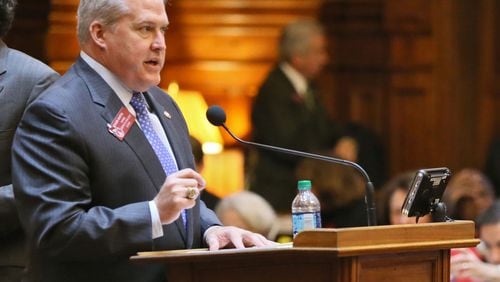Call it the Arthur Ferdinand effect.
Or possibly an attempt to stick up for the little guy. Or maybe pension fatigue after putting so much money into Georgia’s Teacher Retirement System in recent years.
Or all three.
But as the clock wound down on the soon-to-be-suspended 2020 legislative session Thursday night, the House voted down a bill to give county tax commissioners a state-sponsored pension.
In a Legislature that seldom turns down an opportunity to add pensions, or make it easier for people to get them, or add money to them, the defeat of the tax commissioner bill was a surprise, even factoring in that Ferdinand, Fulton County's tax commissioner, is the highest-paid elected official in the state. And some lawmakers don't like that.
Compared with some of the thorny pension issues lawmakers have faced in recent years, House Bill 593 seemed like a relatively harmless measure.
Tax commissioners could opt into a state retirement plan funded by a new $3 late fee on overdue tax bills. That fee would be on top of any existing penalties counties levy for late payments. Some are already on county retirement plans.
Tax commissioners were part of the state's Employee Retirement Plan pension until 2011, when lawmakers sought to cut costs during the aftershocks of the Great Recession, said HB 593's sponsor, House Retirement Chairman Tommy Benton, R-Jefferson. He noted that the state has retirement plans for judges, sheriffs, district attorneys and other elected officials.
“Many tax commissioners have no retirement plan at all or have a plan that is funded with their own money,” Benton said. “No taxpayer who pays their property tax bill on time will contribute a penny to this plan.”
But wary lawmakers have spent recent years pouring hundreds of millions of extra dollars into the teacher pension plan to make it more financially stable, and they’ve seen any attempts to make changes to that plan beaten back by educators and retirees.
Rep. Chuck Martin, R-Alpharetta, a member of the House Retirement Committee, said "pension fatigue" may be setting in.
He told colleagues during floor debate Thursday that pensions are “where you promise something down the road and use other people’s money to pay for it.”
He said counties and their tax commissioners should have to pay for the pension.
“The county tax commissioners should be doing their job, and if they are doing their job, there won’t be anyone contributing to their (pension) plan,” he said, because nobody will be paying late fees.
House Minority Whip William Boddie, D-East Point, made a case that the pension plan shouldn't be funded out of late fees from people struggling to pay their tax bills.
The General Assembly regularly tacks fees onto court filings or offenses to fund various things.
“This is unnecessarily punitive, and this is not right,” Boddie said. “We are going to penalize individuals who are already going through financial hardship. Three dollars is a lot of money for somebody who doesn’t have $3.”
He said the more late-fee money tax commissioners collect, the bigger their pension fund. In other words, they’d have a personal incentive to collect more late fees.
After about 10 minutes of debate, opponents mentioned the elephant in the room: Ferdinand’s salary.
The Atlanta Journal-Constitution reported last year that Ferdinand earned a $491,193 salary because of a system that allows him to receive a fee for collecting taxes from cities.
An AJC report in 2019 showed 48 tax commissioners pocket thousands in fees from cities that pay for tax collection services.
However, most tax commissioners make far less than Ferdinand, as supporters of the bill pointed out.
"A lot of tax commissioners operate very differently, and to paint them all with one brush is not fair," said Rep. David Knight, R-Griffin.
Rep. Al Williams, D-Midway, said: "There are not a lot of $500,000 tax commissioners in Georgia. There are a lot of rural counties where tax commissioners are just making it."
But Martin said he was concerned that if the late fees don’t raise enough money, supporters of the fund will come to the state looking for money to prop up the tax commissioners’ pensions.
The bill failed 83-72.
About the Author








